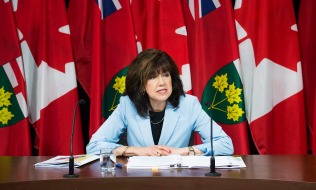

The union representing government employees in Ontario is siding with auditor general Bonnie Lysyk in a $10.7-billion accounting dispute with the Liberal government.
The disagreement is about whether a $10.7-billion surplus in two jointly sponsored pension plans, the Ontario Teachers’ Pension Plan and the Ontario Public Sector Employees Union Pension Plan, should appear as an asset in the government’s financial statements.
“We agree entirely with Ms. Lysyk when she says that the money in jointly trusteed pension plans is ‘for the benefit of employees and retirees,’” said Warren Thomas, president of the Ontario Public Service Employees Union, in a news release. “I will never support any move to allow the government to siphon money from any of those plans for any other purpose.”
Read: Ontario can include pension surplus in financial statement: panel
An expert panel sided with the government on Monday, saying the surplus is an asset because it has a future economic benefit since the government could reduce contributions and would therefore have additional funds to spend elsewhere, but Lysyk disagreed and said it can’t unilaterally access the surplus.
In order for her to issue a clean audit opinion, she wants to see a letter from the unions representing workers covered by the plans saying the province can use that money. “Show me the letter that says you can use that pension money with permission, with an agreement,” she said Thursday. “Until that happens the bottom line is this office can’t give its stamp of approval on this particular issue.”
But the government opposed her request and said it has a right to add the surplus by referring to joint pension agreements that spell out how extra money is to be accounted for.
Accounting the surplus would give the government breathing room and means that $10.7 billion doesn’t get added to the already more than $300-billion debt.
Read: Ontario pension accounting dispute shows difference of $1.5B in province’s deficit
“Members of my union were fighting for joint trusteeship at least as far back as the 1960s because they were tired of seeing government after government using their retirement savings as a source of cheap capital,” said Thomas. “We first got joint trusteeship in the early 1990s. As a result, we have a number of extremely well-run pension plans that deliver good, stable incomes to retirees at a very affordable cost.
“We have no interest in going back in time.”
